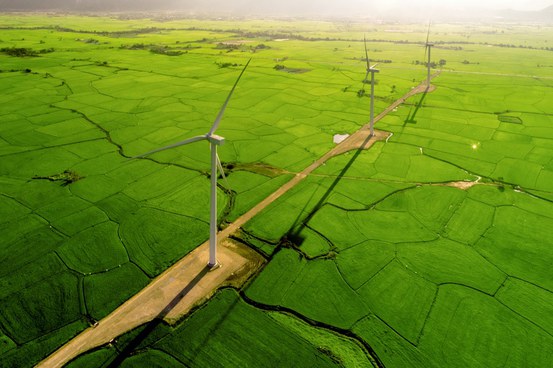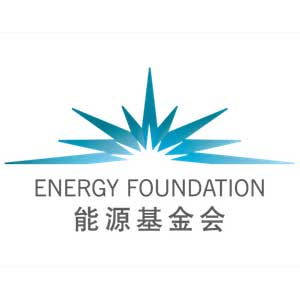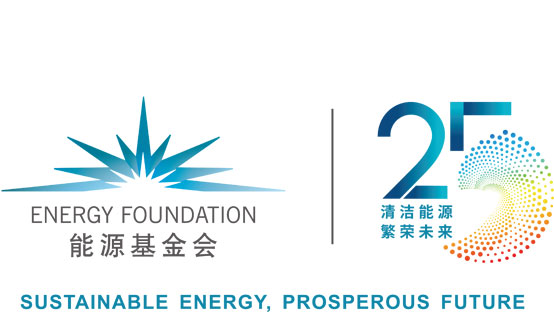Let Renewable Energy Lead China Forward

Renewables have become an important part of China’s energy supply. Since the promulgation and implementation of the monumental Renewable Energy Law, this industry has entered a period of rapid development. In 2018, new increase and the total of installed capacity of hydro, wind, and photovoltaic power in the country both ranked number one in the world. In the same year, the proportion of renewable energy as part of its total energy consumption continued to increase with installed capacity of renewable power generation accounting for 38.4 percent of the total, actual generation being 26.7 percent of total, and its proportion of primary energy consumption reaching 12.4 percent. China’s clean and decarbonized energy system has begun to take shape.
In the past 20 years, Energy Foundation China has cooperated with leading renewable experts to provide support to and participate in researches related to international experiences, policies, pilot demonstration programs, and capacity building efforts. It has made great contributions to pushing for renewables gradually taking up a leading role in the Chinese energy system. And it has continuously helped establish consensus and explore pathways for building a renewable energy centric country for the future.
Drawing Support for the Renewable Energy Law From Scratch
From the early days of reform and opening up in late 1970s to 2000, China’s energy efficiency increased significantly, managing to support a quadrupling of gross domestic product with only a doubling its energy consumption. However, problems began to surface and worsen as the Chinese economy rapidly expanded, such as insufficient energy supply, obsolete energy structure, serious environmental degradation, and heavy dependence on energy import. People began to ask for solutions and talk about large-scale development of renewable energy in China.
In November 2000, EF China stated at its meeting of the Senior Policy Advisory Committee that China should draft a renewable energy law as soon as possible in order to promote utilization of renewable energy as part of fossil fuel substitution efforts. This was the first proposal for renewable energy legislation in China. It also opened up wide-spread discussions on this subject in China.
Between 2001–2003, EF China provided support to pre-research projects on renewable energy legislation. Through detailed demonstration and analysis of experiences from aboard, research teams identified feasible ideas and principles of this kind of legislation and a basic framework for constructing similar systems in China. As a result, the Renewable Energy Legislation Research Report came out in August 2003. It was China’s first publicly-released comprehensive research report on this subject, providing a basis for subsequent systematic research. Back then, EF China also sponsored a series of seminars and forums on related topics. At the 2002 International Symposium for Renewable Energy Policy, government officials, experts, and scholars from the United States, Europe, and other countries provided insights from their own experiences and practices in this field, further propelling Chinese explorations in this area.
In June 2003, the Standing Committee Chair’s Meeting for the 10th NPC identified renewable energy law as part of the legislative agenda for the year. Mao Rubai, chair of the NPC’s Environmental and Resources Protection Committee, personally took the lead in conducting in-depth research on this subject. During the period, teams responsible for research and drafting were made up with personnel from the committee, the National Energy Administration (NEA), the Energy Research Institute (ERI), and other Chinese research institutions. They carefully studied and borrowed international experiences in this field. EF China’s team of multinational experts were invited to provide professional insight and analysis for these research and drafting teams. Under intense efforts from various stakeholders, the Renewable Energy Law went through its drafting and deliberation process in just over a year. It was approved by the Standing Committee of the NPC in February 2005 and officially took effect on January 1, 2006. It established a framework that included aggregate targets, categorized electricity prices, mandatory grid access, cost sharing, and special funds, acting as a strong legal basis for the industry and representing an milestone in the development of renewable energy in China.
After the law’s introduction, EF China continued to provide support to various stakeholders on matters concerning implementation. In 2007, it supported a symposium hosted by the Chinese Renewable Energy Industries Association on the first anniversary of the law. Officials from seven ministries led by the Environmental and Resources Protection Committee and the NDRC discussed about achievements and problems related to implementation, laying the foundation for the subsequent roll out of further rules and measures. In addition, EF China provided support to policy research on the establishment of important regulatory systems, assisting the ERI, Tsinghua University, the China Association of Circular Economy, and other institutions. They carried out a series of studies on a system of categorized electricity prices, a cost-sharing system, and implementation of management measures. Specifically, the Policy Study on Categorized On-Grid Electricity Prices for Photovoltaic Power in 2013 received significant attention and has become an important reference point for policy discussion in this area, contributing to steady development of the photovoltaic industry.
In the meanwhile, EF China actively promoted local implementation of relevant regulations, and supported pilot projects in Jiangsu, Fujian, Jilin, Gansu, Sichuan, and Beijing by assisting in necessary researches on development goals and specific implementation plans for provincial and municipal governments. The foundation also invited experts to evaluate implementation on the ground, and then published a series of reports, such as Review and Evaluation of the Implementation of the Renewable Energy Law, The Development Report on the Renewable Energy Industry in China, and A Compilation of the Renewable Energy Law and Related Policies.
According to Wang Zhongying, head of the ERI, EF China was the first international organization to provide technical assistance and analytical research to China with regard to renewable energy legislation. Over the years, it has been steadfast in its support for analysis and education programs that inform policy research, enforcement, and related policy mechanisms, making important contributions to the establishment and growth of China’s renewable energy industry, the construction of a system with a high penetration of renewable energy, and the promotion of energy transformation.
Promoting the Improvement of Various Policy Mechanisms for Renewable Energy
Renewable energy development requires a systematic approach. It not only needs legal support and guidance, but also a series of top-down design and implementation work on policy, planning, funding, and technology. To this end, EF China has supported a large number of analysis and education projects by various Chinese institutes over a long period of time.
In 2007, China issued the Medium- and Long-Term Plan for National Renewable Energy Development. Since 2009, it has successively proposed target ratios of non-fossil energy as part of primary energy consumption in 2015, 2020, 2030, and 2050 and corresponding energy development strategies. With an eye on actual implementation of plans and strategies, EF China supported a number of industry roadmap studies in the past 10 years, such as the Development Roadmap Study on Wind and Photovoltaic Power Industrialization by the ERI and the Chinese Wind Energy Association and the 2050 High-Penetration Renewable Energy Scenario Analysis and Implementation Roadmap by the National Renewable Energy Center, in order to provide detailed analysis and feasible pathways for industries.
Research on renewable energy quotas is an important direction supported by EF China. Since 2002, it has begun to support pre-research on the subject, engaging in feasibility analysis of quota target establishment, system framework design, and operation mechanism, and exploring ways for renewable energy to participate in electricity market from the angle of trading mechanisms. It has also sponsored academic seminars, international exchanges, and capacity building activities, in order to provide solid technical support to and share practical research information with government officials, experts, and enterprises in the field. In May 2019, China issued a notice to guarantee renewable electricity consumption. After 17 years of research, the quota system was finally introduced, and various provinces and cities were identified as responsible for their consumption with minimum proportion targets. The industry believes that this is one of the key mechanisms for China’s renewable energy development in the future.
With increasing installed capacity of renewable energy and the lag of power grid construction, the problem of wasted wind and solar energy has become increasingly prominent as a bottleneck for the growth of renewable energy in China. Since 2009, EF China has provided support to the ERI on conducting a series of studies to explore support conditions with regard to the grid, and models and pathways for China to achieve sustainable and large-scale development in this area. In addition, it provided support to the National Renewable Energy Center over introducing the U.S. experiences on Utility Variable-Generation Integration Group and leading the formation of the China Variable-Generation Integration Group. The goal was to disseminate discussions of technologies, practices, institutional mechanisms, and policy measures, and build a platform for experts, research institutions, and enterprises to reach a consensus over viable solutions.
As a relatively new field of renewables in China, distributed power generation gradually shows its future potential. Since 2005, EF China has sponsored researches on related policies, financing mechanisms, pilot demonstrations, business models, and promote its development and that of smart energy Internet. In 2009, it supported research on the planning and construction of a new energy model city and a smart microgrid demonstration project based on the concept of distributed renewable energy in the Turpan’s New District, Xinjiang. The research findings provided important support to the project, and helped it become the first commercialized microgrid demonstration project in China. In 2016, EF China provided support to the Chinese Renewable Energy Industries Association over its efforts of carrying out research on the technology roadmap for distributed power generation in China. It made scenario analysis and prediction for the period of 2016 to 2020 after comprehensively analyzing the technology’s potential, economic viability, problems and obstacles, and trend of development, based on relevant information from home and abroad. In 2017, the foundation supported the green power action project on analyzing pathways for establishing a market-based pilot project for the technology in China.
China’s renewable energy development has begun to focus on quality over quantity. Renewable energy will gradually become mainstream with types of technology and application models involved undergoing profound changes. And people will increasingly bear witness to its economic benefits. “With the advent of the 5G Internet era, China’s electrification will be an inevitable trend in the future. There will be increasing demand for energy from industry, buildings, and transportation. And the decarbonization of the power sector is set to become an integral part of China’s economic transformation. EF China will strive to increase the penetration of renewable energy as part of the total, reduce the consumption of fossil fuels, and promote a sustained deep decarbonization of the power sector by strengthening institutional reforms and technological innovations,” said Dr. Lijin Zhong, the Chief of Staff and acting director of the Clean Power Program of EF China.



